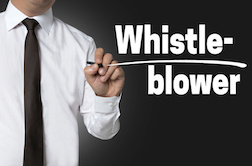LAWSUITS NEWS & LEGAL INFORMATION
SEC Fraud Whistleblower Lawsuits
By Jane Mundy
Under the SEC Whistleblower program, a successful whistleblower lawsuit can award a whistleblower of 10-30 percent of the amount the SEC recovers in sanctions, depending upon the quality of information provided to defraud government. Since the Securities and Exchange Commission (SEC) implemented the Whistleblower Program, it has seen a considerable increase in complaints. The program also protects whistleblower rights and prohibits retaliation. Blowing the whistle can get very complicated, so if you plan to “blow the whistle’, first seek advice from a whistleblower attorney. If you wait too long or go to the FBI alone, there is a chance that you could miss a claim and whistleblower award, or even worse, risk being found complicit in the fraud.
The SEC is authorized by Congress to provide monetary awards to eligible individuals – whistleblowers — who come forward with original, detailed and high-quality information that exposes SEC fraud. Such information can result in a Commission enforcement action in which over $ 1 million in sanctions is ordered. The range for whistle blower awards is between 10- 30 percent of the money collected in actions brought by the SEC and related actions brought by other regulatory and law enforcement authorities. The Whistleblower Program also prohibits retaliation by employers against employees who provide them with information about possible securities violations. "The Whistleblower Program is designed to aid the SEC's efforts to protect investors from those who violate the securities laws by encouraging those who are aware of misconduct to come forward to report it to us so that prompt and effective action can be taken to prevent or stop the misconduct." …Sean X. McKessy, Former Chief, Office of the Whistleblower, Aug 11, 2011
"The Whistleblower Program is designed to aid the SEC's efforts to protect investors from those who violate the securities laws by encouraging those who are aware of misconduct to come forward to report it to us so that prompt and effective action can be taken to prevent or stop the misconduct." …Sean X. McKessy, Former Chief, Office of the Whistleblower, Aug 11, 2011
The U.S. Securities and Exchange Commission (SEC) whistleblower program went into effect on July 21, 2010, when President Obama signed into law the Dodd-Frank Wall Street Reform and Consumer Protection Act. Since that time, the SEC has reported a significant increase in complaints, and in particular security fraud, including manipulation of a security's price or volume, Ponzi schemes, insider trading, theft, bribery of foreign officials, and more. In a press release(May 2017), the agency announced that, since the program began, it has levied nearly $1 billion in penalties and awarded some $154 million to 44 whistleblowers. Unlike other kinds of whistle blowers, SEC whistle blowers can remain anonymous forever.
Also since 2011, the SEC has recovered $975 million in enforcement actions ranging from elaborate investment schemes to financial advisors working to benefit themselves rather than their investors. Up until 2015 the SEC received 10,540 tips with the bulk of the tips coming from California (2,046) with New York State coming in second (950). It also received tips from outside the US – the top five locations were the UK, Canada, China, India and Australia.
Once a tip is received, attorneys in the SEC enforcement division evaluate the information and decide if enforcement action is necessary, then the SEC has nine months from passage to implement rules governing the process.
In April 2017, the SEC awarded a whistleblower $4 million, who gave information about securities misconduct, and assisted the SEC throughout its investigation by providing industry-specific knowledge and expertise. About a week later, the SEC awarded $500,000 to a corporate insider whose tips prompted and assisted with an enforcement action. The tipster informed the SEC about hard-to-detect violations of securities laws. The information led the SEC to conduct a formal investigation and take subsequent enforcement action.
Last updated on
FREE SEC FRAUD WHISTLEBLOWER LAWSUIT EVALUATION
Send your SEC Fraud Whistleblower claim to a lawyer who will review your claim at NO COST or obligation.
GET LEGAL HELP NOW
GET LEGAL HELP NOW
The Securities and Exchange Commission (SEC) Whistleblower Office
The U.S. Securities and Exchange Commission (SEC)is the federal agency responsible for enforcing the federal securities laws, regulating the securities industry and overseeing the nation's stock and options exchanges.The SEC is authorized by Congress to provide monetary awards to eligible individuals – whistleblowers — who come forward with original, detailed and high-quality information that exposes SEC fraud. Such information can result in a Commission enforcement action in which over $ 1 million in sanctions is ordered. The range for whistle blower awards is between 10- 30 percent of the money collected in actions brought by the SEC and related actions brought by other regulatory and law enforcement authorities. The Whistleblower Program also prohibits retaliation by employers against employees who provide them with information about possible securities violations.
The SEC Whistleblower Program
 "The Whistleblower Program is designed to aid the SEC's efforts to protect investors from those who violate the securities laws by encouraging those who are aware of misconduct to come forward to report it to us so that prompt and effective action can be taken to prevent or stop the misconduct." …Sean X. McKessy, Former Chief, Office of the Whistleblower, Aug 11, 2011
"The Whistleblower Program is designed to aid the SEC's efforts to protect investors from those who violate the securities laws by encouraging those who are aware of misconduct to come forward to report it to us so that prompt and effective action can be taken to prevent or stop the misconduct." …Sean X. McKessy, Former Chief, Office of the Whistleblower, Aug 11, 2011The U.S. Securities and Exchange Commission (SEC) whistleblower program went into effect on July 21, 2010, when President Obama signed into law the Dodd-Frank Wall Street Reform and Consumer Protection Act. Since that time, the SEC has reported a significant increase in complaints, and in particular security fraud, including manipulation of a security's price or volume, Ponzi schemes, insider trading, theft, bribery of foreign officials, and more. In a press release(May 2017), the agency announced that, since the program began, it has levied nearly $1 billion in penalties and awarded some $154 million to 44 whistleblowers. Unlike other kinds of whistle blowers, SEC whistle blowers can remain anonymous forever.
Also since 2011, the SEC has recovered $975 million in enforcement actions ranging from elaborate investment schemes to financial advisors working to benefit themselves rather than their investors. Up until 2015 the SEC received 10,540 tips with the bulk of the tips coming from California (2,046) with New York State coming in second (950). It also received tips from outside the US – the top five locations were the UK, Canada, China, India and Australia.
Once a tip is received, attorneys in the SEC enforcement division evaluate the information and decide if enforcement action is necessary, then the SEC has nine months from passage to implement rules governing the process.
SEC Whistleblower Laws
The SEC Whistleblower Program is dictated by two federal laws, and these acts impact all SEC whistleblowers:- Dodd Frank Act (DFA), which creates the SEC's whistleblower program and provides rewards to whistleblowers who report fraud to the SEC, Commodity Futures Trading Commission (CFTC), and other government authorities
- Sarbanes Oxley Act (SOX), which protects whistleblowers from retaliation for reporting violations of any rule or regulation of the SEC; federal criminal provisions relating to securities, bank, mail, or wire fraud; and any federal law relating to fraud against shareholders
- Whistleblower Protection: SEC whistleblowers are guaranteed strong protection against retaliation. However, to qualify for whistleblower protection, the SEC's rules require that you prove that your employer was on notice of your complaint and that your complaint was a "contributing factor" that led to the retaliation.
- Whistleblower Confidentiality: SEC whistleblowers are allowed to report fraud anonymously. However, to qualify for confidentiality, the SEC's rules state that you must file your whistleblower complaint through legal counsel.
SEC Whistleblower Attorney
An SEC Whistleblower attorney will first determine whether you have a strong case by investigating, evaluating and filing your case. Your whistle blower lawyer will collaborate with the government throughout the process—that can sometimes take years—to maintain your anonymity and maximize your reward.SEC Fraud Lawsuits and Settlements
There are hundreds of Financial Fraud schemes, besides stock and securities fraud. Some common fraud schemes may involve:- Asset Management Fraud, including fraud involving investment advisors, investment companies, hedge funds, and private equity funds
- Foreign Corrupt Practices Act Violations, including bribery and the making of payments to foreign government officials, politicians, and political parties to obtain or retain business.
- Market Abuse, including insider trading rings, broker fraud, and complex manipulation schemes.
- Municipal Securities and Public Pension Abuse, including offering and disclosure fraud, tax or arbitrage-driven fraud, pay-to-play and public corruption violations, public pension accounting and disclosure violations, and valuation and pricing fraud.
- Public Company Misstatements, including accounting fraud and material misstatements and omissions that might influence or change the decisions of investors or financiers.
- Significance of Information: The SEC wants strong, well-documented tips, especially first-hand details that expose large-scale securities and commodities violations. As a result, whistleblowers who provide the most significant information will receive the most significant rewards
- Degree of Assistance: The SEC wants whistleblowers and their attorneys to provide substantial assistance, especially during the investigation and pretrial phases of the case. As a result, whistleblowers who provide the greatest degree of assistance will receive the most significant rewards.
- Potential for Deterrence: The SEC wants whistleblower cases that deter future financial misconduct, especially the type of dishonesty that caused the Enron, WorldCom and Bernie Madoff investment scandals. As a result, whistleblowers who bring cases that have the greatest potential to deter future frauds against investors will receive the most significant.
SEC Whistleblower Rights and Retaliation
SEC whistleblower retaliation occurs when you are wrongfully terminated, intimidated, harassed, or subjected to any other form of discrimination after engaging in a protected whistleblower activity. SEC whistleblower protection laws prohibit an employer from retaliating against you after you make a complaint about a violation of any law, rule, or regulation subject to SEC regulation. These laws broadly apply to a wide class of employees, including:- Employees of publicly traded companies
- Employees of subsidiaries and affiliates of publicly traded companies
- Employees of contractors, subcontractors, and agents of publicly traded companies
- Employees in the financial services industry who disclose information concerning fraudulent or unlawful conduct relating to a consumer financial product or service
SEC Whistleblower Lawsuits
Two whistleblowers who gave information on a JP Morgan scheme to overcharge investors in 2015 will split a $61 million reward. It is the largest award ever given to a whistle blower in SEC history. The previous record was $20 million, reported by Bloomberg News (July 2017)In April 2017, the SEC awarded a whistleblower $4 million, who gave information about securities misconduct, and assisted the SEC throughout its investigation by providing industry-specific knowledge and expertise. About a week later, the SEC awarded $500,000 to a corporate insider whose tips prompted and assisted with an enforcement action. The tipster informed the SEC about hard-to-detect violations of securities laws. The information led the SEC to conduct a formal investigation and take subsequent enforcement action.
SEC Fraud Whistleblower Legal Help
If you think you may have an SEC whistleblower claim, don't delay. The law has very strict time limits. If you wait too long, you will lose the right to file your whistleblower complaint or someone will file before you. The sooner you involve an SEC whistleblower law firm, the greater your chances of success.Last updated on
SEC FRAUD WHISTLEBLOWER LEGAL ARTICLES AND INTERVIEWS
The Legal Landscape for Whistleblowers May Have Changed

Medical Device Manufacturer Admits to Wrongdoing, Faces $14 Million Penalty

Plaintiff Wants Appeal of Years-Long Claims, Defendant Opines to ‘Get on with It’


March 2, 2018
Washington, DC: The filing of an SEC whistleblower lawsuit may become that much more focused following a recent decision by the US Supreme Court that puts the emphasis on the reporting of apparent corporate wrongdoing to the US Securities and Exchange Commission (SEC), as required under guidelines entrenched in the Dodd-Frank Act. READ MORE
Medical Device Manufacturer Admits to Wrongdoing, Faces $14 Million Penalty

February 2, 2018
Washington, DC: It was a little over a year ago that the US Securities and Exchange Commission (SEC) issued an official press release announcing that a Texas-based medical device company, Orthofix International (Orthofix), had agreed to pay $14 million to settle charges brought by the regulator with the help of two SEC fraud whistleblowers. Orthofix, which has faced a SEC whistleblower lawsuit in the past, also agreed to admit to wrongdoing. READ MORE
Plaintiff Wants Appeal of Years-Long Claims, Defendant Opines to ‘Get on with It’

January 5, 2018
San Francisco, CA: A years-long healthcare fraud whistleblower lawsuit remains an apt example of just how long in the tooth litigation can extend. And while the current version of a health care fraud lawsuit does not resemble the characterization of the original litigation, attempts at various appeals could extend the litigation well beyond 2018. READ MORE
READ MORE Whistleblower Settlements and Legal News
READ MORE Securities Settlements and Legal News
READ MORE Whistleblower Settlements and Legal News
READ MORE Securities Settlements and Legal News
READ MORE Whistleblower Settlements and Legal News

READER COMMENTS
Iris Benchlouche
on
we want to publish it in the media asap, and sue the sec? Pls advice?